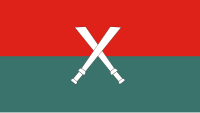Kachin Independence Army
| Kachin Independence Army | |
|---|---|
|
ShangLawt Hpyen Dap ကချင် လွတ်မြောက်ရေး တပ်မတော် Participant in the Internal conflict in Myanmar |
|

Flag of the Kachin Independence Army
|
|
| Active | 1961–present |
| Ideology |
Kachin nationalism Federalism Communism (historical) |
| Leaders | Lanyaw Zawng Hra |
| Headquarters | Laiza, Kachin State |
| Area of operations |
Kachin State, Myanmar Yunnan, China Northeast India |
| Strength | 8,000 (2012) |
| Part of | Kachin Independence Organisation |
| Allies |
Northern Alliance Other allies |
| Opponents |
State opponents
Non-state opponents |
| Battles and wars | |
Northern Alliance
Other allies
State opponents
Non-state opponents
The Kachin Independence Army (Kachin: ShangLawt Hpyen, Burmese: ကချင် လွတ်မြောက်ရေး တပ်မတော်; abbreviated KIA) is the military wing of the Kachin Independence Organisation (KIO), a political group of ethnic Kachins in northern Myanmar (Burma). The Kachins are a coalition of six tribes whose homeland encompasses territory in Yunnan, China, Northeast India and Kachin State in Myanmar.
The KIA is funded by the KIO, which raises money through regional taxes and trade in jade, timber and gold. Its rifles are a combination of AK-47s, home-made rifles (such as KA-07s) and some artillery. KIA headquarters are outside Laiza, in southern Kachin State near the Chinese border.
In 2009, Thomas Fuller of the New York Times estimated the number of active KIA soldiers at about 4,000. They are divided into five brigades and one mobile brigade. Most are stationed in bases near the Chinese border, in KIO-held strips of territory. In October 2010, KIA commanders said that they had "10,000 regular troops and 10,000 reservists". In May 2012, the group had about 8,000 troops.
In 1949 Naw Seng, a Kachin, was a captain in Kachin Battalion 1. He went underground during the Kayin-Bama riot and joined the Karen National Defense Organization. He was active in northern Shan State as a KNDO agent in 1950. At that time, Zaw Seng was attending the government high school in Lasho. He contacted Naw Seng, and followed him underground. Naw Seng took refuge in China in 1951, and Zaw Seng remained in the KNDO in Than-daung and Baw-ga-li.
...
Wikipedia
